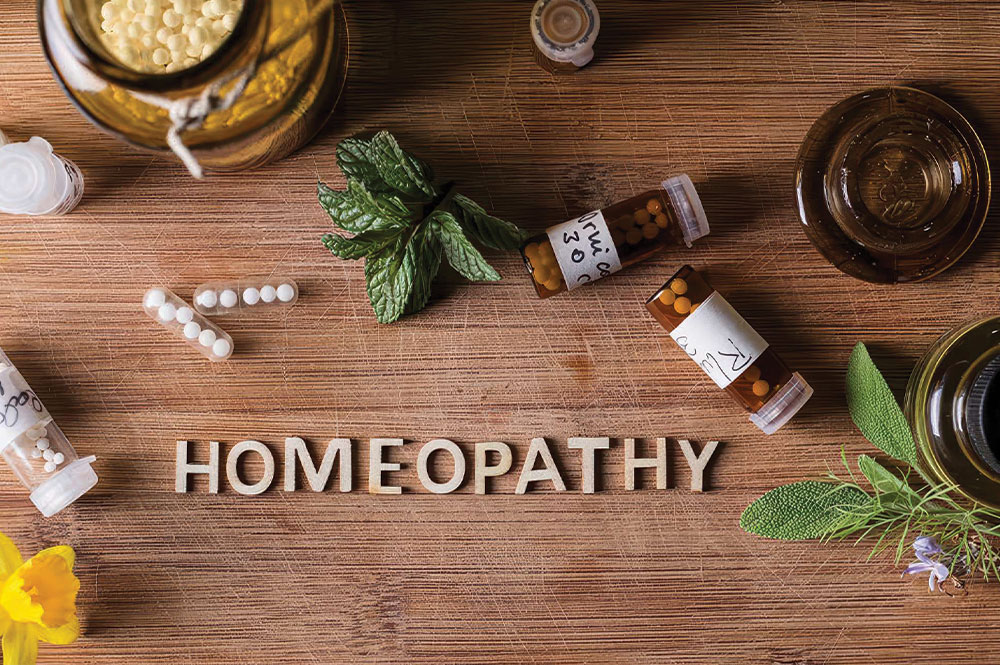Homeopathy
Contact us
for an appointment
Call us at +30 6981 299 120 or fill out the form, and we will contact you.

Homeopathy, as a system of treatment, is not very old. Its founder, Samuel Hahnemann, passed away about two centuries ago. However, the idea that underlies homeopathy is much older and traces back to Hippocrates, with his saying “similia similibus curantur” (like cures like). One interpretation of this is that “what harms you” can also “heal you.”
In homeopathy, the human organism is viewed in a different way. There is a deep intelligence within all of its functions, working to ensure that the body responds in the best possible way to disturbances. These disturbances can come from the external environment (heat, cold, humidity, injuries, etc.) or from internal factors, whether biological (toxins, infections, etc.) or psychological (emotional stress, mental disorders, depression, anxiety, obsessions, etc.).
The various symptoms produced are not considered phenomena of the disease but rather phenomena of the body’s response. The appearance of these symptoms is seen as the best possible response to the harmful influences. This perspective changes the way we view disease. The body is no longer a passive recipient of disturbances but a beneficial system of homeostasis. The symptom, instead of being a mere discomfort that we want to eliminate, becomes something else — a deeper mirror of what is truly happening.
Through collaboration with the patient, an extensive history is gathered, including family history, childhood illnesses, current diseases, habits, and various characteristics of their life (sleep, diet, sweating, thermoregulation, etc.), along with basic information about their personality, reactions to stress, fears, psychological history, and living conditions. The current situation that led the patient to the clinic, along with all clinical symptoms, lab findings, imaging tests, and any other information that could help create a full picture of the disorder, are examined thoroughly and recorded in detail. The goal is for the physician to observe as objectively as possible the overall functioning of the organism and how a disturbance manifests at all levels of existence. Therefore, the aim is to understand the basic way the organism tries to counterbalance the disturbance by producing symptoms.
The next step is to identify which homeopathic remedy best matches the patient’s symptoms. Administering it triggers a response in the body, stimulating further mobilization to restore a better balance.
Restrictions:
In homeopathy, certain substances like coffee, camphor, mint, and cinnamon are typically prohibited. These substances are stimulatory and strongly aromatic. Based on my experience, this is not absolute. For many patients, especially those already experiencing some form of stimulation (such as insomnia, irritable bowel syndrome, hyperthyroidism, hypertension, etc.), it’s advisable to avoid them, whether they are undergoing homeopathic treatment or not. In others, this is not necessary, and a coffee consumed over time does not negatively affect the body. It’s up to the doctor’s discretion to advise which substances to avoid.
Conventional Treatment:
Many patients seek homeopathic treatment while already on medication for chronic problems (hypertension, diabetes, autoimmune diseases, heart diseases, etc.). In these cases, care and thorough knowledge of conventional pharmacology are essential. The basic rule is that if someone uses a crutch to maintain balance, it should not be taken away abruptly, as they might fall and create more complex issues. There are ways to handle such situations, which are not always simple, and in many cases, conventional medications are gradually reduced as the symptoms improve due to the homeopathic treatment. This is one of the reasons why homeopathy and its therapeutic potentials should be managed by medical doctors.
What Are Homeopathic Medicines?
Homeopathic medicines are prepared from plants, minerals, metals, salts, and some animal substances (e.g., bee venom). In theory, any substance found in nature can be made into a homeopathic remedy. Their preparation involves successive dilutions of the basic substance, combined with a process of shaking—dynamization—of the solution. This way, the immediate chemical effects of the solution are neutralized while its dynamic—energetic effect is enhanced. Any toxic effects are eliminated, which is why homeopathic medicines are safe and can be administered to infants, toddlers, and pregnant women without risk.
Conditions Treated by Homeopathy:
Homeopathy can be applied to virtually every disease, both acute and chronic, except for urgent surgical cases. It is emphasized that the physician should have a very clear understanding of when, how, and what to use for the treatment of each patient. Some conditions commonly treated by homeopathy include:
- Pediatrics: Dermatopathies, asthma, infections, allergies of the upper and lower respiratory tract, etc.
- Dermatology: Eczema, psoriasis, acne, nail diseases, various types of hair loss, hives, herpes, shingles.
- Rheumatology / Autoimmune diseases: Rheumatoid arthritis.
- Thyroid diseases, musculoskeletal problems, headaches, digestive issues, gynecological, cardiovascular system, insomnia, panic attacks, anxiety disorders, obsessions, depression, concentration issues, memory problems, etc.
Homeopathy treats patients, not diseases. The conditions mentioned above are listed for easier communication in everyday language. It is important to note that homeopathy is not a universal cure-all. Each patient is a unique case, and the limits of treatment cannot be generalized.

